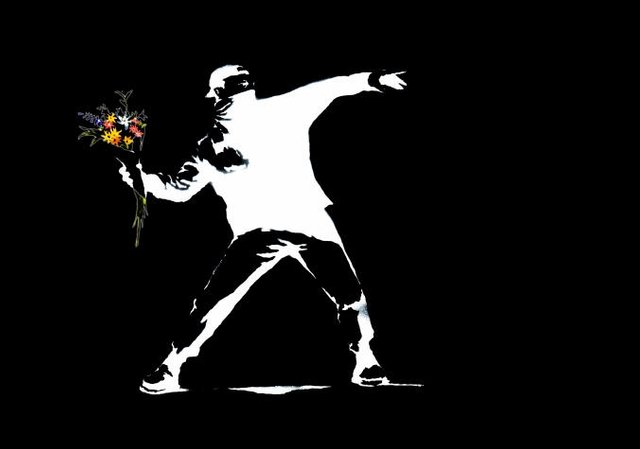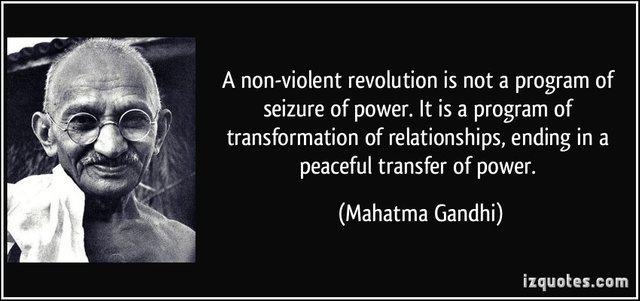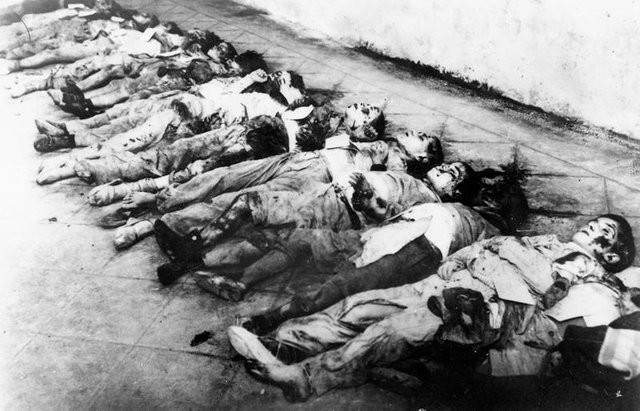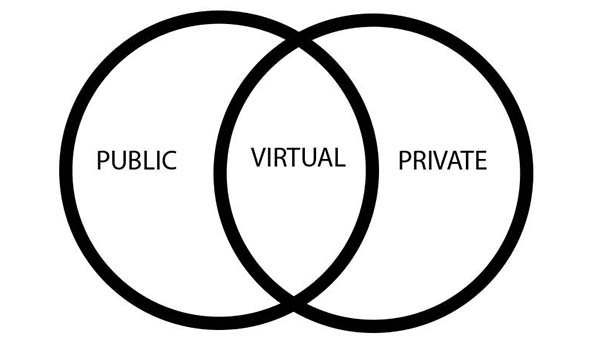How May We Prevent War? - A Visionary's Manifesto

The Divine Inspired this Question Through My Soul Sister Ellie and I During a Casual Nightcap...
We had just gotten back to my place after watching our good friends perform at a lounge nearby. We were sharing a small J and discussing life as we usually do when she suddenly asked me if I thought there should be more gun laws... I honestly wasn't prepared to answer that question but I recognized a brief impulse to remain politically correct as well as the many rationalizations to give her a half-assed answer. However, I decided to take a moment before I uttered words of insignificance, only after my mouth had already motioned to deliver them. Virginia Woolf popped into my mind immediately thereafter and I asked, "Why must we rely on guns for a sense of protection?... Where does this reliance even come from? Why must we resort to violent means when people like Gandhi have already proved that the most powerful and profound revolutions are the ones that don't need a single shot to be fired?"


I mentioned Virginia Woolf because she explored the roots of violence and traced it back to patriarchal society, attempting to expose this cause in her major work "Three Guineas."

In order to bring clarity to her answer, Woolf empowers the reader by informing them of the dynamic between the public and private worlds that both men and women live--but more importantly, how each gender has a vastly different experience of both spheres through ways of education, professions, and how those two influence opinions about war. Virginia Woolf starts her essay, “Three Guineas” by stating that “Three years is a long time to leave a letter unanswered” (pg. 1)--for which the motivation behind this response was the question “How in your opinion are we to prevent war?” (pg. 1). Immediately, curiosity arises and the reader finds themselves asking who is the letter being addressed to? Why are you only now responding? And what is your answer to the question proposed? The answers to the first two questions can be simply found in the first two pages, the third, however, results in the entity that is “Three Guineas.”
At the time of this being published (1938) the Spanish Civil War (1936 - 38) is still fresh in Europe and the world's consciousness. It’s also important to understand that only 2 decades before, the Parliament Reform Act granted women in Britain over the age of 30 the right to vote and of course, all men were granted this right--only demonstrating further the disparities between men and women. The war struck a particularly sensitive chord in Woolf as she received photographs of homes destroyed and the dismantled body parts of women and children that were circulating across Europe as a propaganda effort, occurring on a weekly basis. This marked the first war in which civilians were being bombed and publically displayed. Woolf also had a nephew who volunteered his services as an ambulance driver, despite her pleading against it, which led to the loss of his own life and struck the family very hard, especially Virginia. Witnessing the rise and the effects--global and personal--of fascism, along with the continued unequal treatment of women, is what inspired this book and what Jane Marcus recognizes many people at the time would rationalize as “A Communist Manifesto for Women” (l) in her introduction to "Three Guineas"--notice the italics.

Woolf first points to Education when demonstrating the vastly different lives men and women shared in the public and private sectors during this time. In the private sector, Woolf recognizes that both genders speak with the same accent, use the same utensils to eat, similarly expect the maids to do their jobs, can talk casually over dinner about politics and sociology, and now both can earn their own livings (pg. 6). However, Woolf continues “But… those three dots mark a precipice, a gulf so deeply cut between us that for three years and more I have been sitting on my side of it wondering whether it is of any use to try to speak across it” (pg. 6). Although both genders share these similarities, Woolf knows there’s still a gap. Reading this essay, the fact that Woolf was self-taught might not be apparent but she definitely goes to great lengths to explain how men and women don't share the same privilege of being educated. Woolf speaks of how Arthur’s Education Fund and the continuous flood of investments by English families have primarily been focused on the empowerment of men and their education. This, along with the disparity that comes along with it, is demonstrated further when Woolf states:
“And to [Arthur's Education Fund your sisters[…]made their contributions. Not only did their own education[…] go into it; but many of those luxuries and trimmings which are, after all, an essential part of education--travel, society, solitude, a lodging apart from the family house--they were paid into it too” (pg. 7).
This speaks volumes as it indicates where the disparities between men and women in terms of education lie--in the more formative years. Because such a heavy emphasis is focused on the men being educated, women have been widely overlooked (for centuries) and now lack the depth of experience that comes with receiving a formal education--which, of course, thrives in the public sector but survives on the private sector. Now, thinking back on what Woolf said about the private sector and the how men and women can be viewed as somewhat on the same level, this begs the question how equal are men and women in the private sector, exactly? From the quotes previously mentioned, it’s clear to see that women have been, for the most part, barred from the public sector through a way of formal education. Speaking for the private sector, how many daughters, during this time period, could debate academically about politics and sociology over a home-cooked meal… not many. There goes that “precipice” again.
Moving along from education to the professions, Woolf points out more disparities. It’s easy to understand that those who are educated stand first in line to obtain positions of power in Law, Finances, and Politics. If women are vastly undereducated then it’s also easy to understand that most of those positions are going to whom? Men, obviously. So again, up until the point of this work being written, women were just then being educated and joining the workforce after being vastly excluded from the public sector for centuries. This meant that women had to turn to a profession lingering in the private sector--marriage (for centuries as well). To ensure their survival in the world, women would have to make it their job to find a man that would sustain their lifestyle because they wouldn’t be able to produce that lifestyle on their own accord. Furthermore, Woolf states:
“It stands to no reason that the wife has a spiritual right to half of her husband’s income because her own work as his wife is unpaid, then she must have as much money to spend upon such causes as appeal to her as he has[…] The fact of the matter is that the taste of the women in our class is markedly virile[…] She spends thousands upon thousands of pounds upon clubs to which her own sex is not admitted; upon racecourses where she may not ride; upon colleges from which her own sex is excluded” (pgs. 68 - 69).
The two conclusions Woolf offers for such actions are either the wife is highly conscious and thoughtful of keeping her man happy, or more likely, her half is spent on these things by the husband and all she’s left with is “board, lodging, and a small allowance for pocket money and dress” (pg. 69). Whether one conclusion is more right than the other is out of the question for this is the reality that women faced on a grand scale. The dependence upon men, only fed into a continuous cycle. Woolf drills this point and the intersectionality of the public and private sector further into the reader’s mind when saying, “It is from this world [the public one] that the private house[...] has derived its creeds, its laws, its clothes and carpets, its beef and mutton” (23), indicating that only way for women to escape this cycle is to gain more respectable positions in the public sphere, and as demonstrated thus far, the only way to do this is to be properly educated.
So how does all of this tie into the lingering question--how can you [Woolf/women in general] help prevent war? To this, Woolf urges the reader to understand that the same patriarchal need to assert dominance in the world over women:
“... Has widened his scope. He is interfering now with your liberty; he is dictating how you shall live; he is making distinctions not merely between sexes, but between races. You are feeling in your own persons what mothers felt when shut out, when they were shut up, because they are women” (pg. 122)
Indicating that the impulse for superiority in the world is something that starts at home and can be characterized as hyper-masculine. However, simply asserting the equal rights of both men and women can be the major stepping stone to preventing more division, more hate, more violence, more war. Learning to love unconditionally and invest in one another fairly and equally, regardless of sex, will provide the transferable skills to do so between races, cultures, social classes, ideologies, and religions. Instead of glorifying one over the other, acknowledge the beauty of the whole, it's complexity and the interconnectivity of it all.

For its time, “Three Guineas” was considered a radical piece of literature. Given the context and nature of the ideas inside the essay, it's not very hard to understand why. In the end, the answer to the question that drives the entirety of the essay is quite simple. However, understanding it, especially in a society still crippled by the patriarchy, is what makes it so cyclically complex and necessary. Woolf goes to great lengths to cover the nuances of patriarchal society and that's why I'm personally so fascinated by this piece of literature. What better person to write such a piece than Virginia Woolf? A woman born way before her time, who felt the stings of a society intent on suppressing her vision and genius intellect. So much so, that her life ended on her own terms--but before doing so, inspired generations.

So now considering the state of the world back when Virginia Woolf wrote what later became referred to as the Bible for Feminism, "Three Guineas," as well as considering the (digital) state of the world today in 2018 (or whenever it is you're reading this) how relevant do you think her arguments still are?

Also, do keep in mind that Woolf hated the word "feminism" and warned her readers against using it in this work as well, telling us it should be burned and erased from the dictionary. What she is really pointing to is the impulse for superiority and how it relates to hyper-masculinity and how it impacted life at home, thus leading to an understanding of how it impacted life beyond in the public sphere.
If you thought this was informative and would like to explore more food for thought then make sure to check out my previous post:
- A Poetic Meditation: The Ego & The "Presence that Disturbs me with the Joy/ Of Elevated Thoughts." (SWC)
- A Poetic Meditation: Nature, Spirituality, and Identity in Emily Dickinson's 1170

Between now and 6.5 days you will receive a @GrumpyCat flag because you or someone else sent money to buy votes from an irresponsible non-GrumpyCompliant service.
@sneaky-ninja @pushup and @aksdwi are acting irresponsibly by selling votes to people on their post in the last hours before payout. = 99.99% abuse rate.
Sending money to these bots is also financially supporting for-profit spammers.
To know what voting bot to use, refer to https://steembottracker.com/ and use those that have 3.5 day or less in the "Max Age" column.
Learn more ...
Wow, did not know this was the case but this was definitely not my intention for this post. You can see that the upvote which you're referring to occurred within the same day by looking at their comment notification so trying to abuse the the platform is out of the question.
And although I use bots to invest in myself and spread the word to people I hope can benefit and feel empowered by my writing and creative expression, I also don't condone bots using those intentions to abuse the platform.
So, thank you for warning me and for your dedication to keeping the Steemit platform safe 🙏
For protection of members as follows :
WE ARE THE RESISTANCE!
You are bullied by @grumpycat on your post, but protected by all members of The Resistance.
Thank you for being in The Resistance.
@GrumpyCat, to your tyranny WE-RESIST
The Resistance
Discord: https://discord.gg/qMWCbWR
I also think nonviolent revolution is better than the violent one
Thank you... you have a nice way of writing, and presenting your posts : )
Thanks!! Very much appreciated
Your welcome! It's always great to find unique content about interesting topics.
Thank you carlos.gonvilla for making a transfer to me for an upvote of 6.35% on this post!
Half of your bid goes to @budgets which funds growth projects for Steem like our top 25 posts on Steem!
The other half helps holders of Steem power earn about 60% APR on a delegation to me!
For help, will you please visit https://jerrybanfield.com/contact/ because I check my discord server daily?
To learn more about Steem, will you please use http://steem.guide/ because this URL forwards to my most recently updated complete Steem tutorial?
Sneaky Ninja Attack! You have been defended with a 23.55% vote... I was summoned by @carlos.gonvilla! I have done their bidding and now I will vanish...Whoosh
Put the guns into our hands and we will use them. Give us the slogans and we will turn them into reality. Sing the battle hymns and we will take them up where you left off. Not one not ten not ten thousand not a million not ten millions not a hundred millions but a billion two billions of us all the people of the world we will have the slogans and we will have the hymns and we will have the guns and we will use them and we will live. Make no mistake of it we will live. We will be alive and we will walk and talk and eat and sing and laugh and feel and love and bear our children in tranquility and security in decency in peace. You plan the wars you masters of men plans the wars and point the way and we will point the gun
This post has received a 15.43 % upvote from @boomerang thanks to: @carlos.gonvilla
Congratulations @carlos.gonvilla, this post is the fifth most rewarded post (based on pending payouts) in the last 12 hours written by a Newbie account holder (accounts that hold between 0.01 and 0.1 Mega Vests). The total number of posts by newbie account holders during this period was 4074 and the total pending payments to posts in this category was $4307.15. To see the full list of highest paid posts across all accounts categories, click here.
If you do not wish to receive these messages in future, please reply stop to this comment.
We are The Resistance!
You are innocently downvoted by @grumpycat on your fresh post.
We are resisting this.
Check this link,spread the word and join us if you would agree.
https://steemit.com/we-resist/@firedream/resistance-started
Discord : https://discord.gg/qMWCbWR
FD